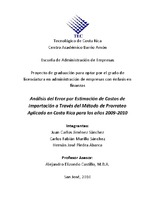Mostrar el registro sencillo del ítem
Análisis del error por estimación de costos de importación a través del método de prorrateo aplicado en Costa Rica para los años 2009-2010
| dc.contributor.advisor | Alejandro Elizondo Castillo | es |
| dc.contributor.author | Jiménez-Sánchez, Juan Carlos | |
| dc.contributor.author | Murillo-Sánchez, Carlos Fabián | |
| dc.contributor.author | Piedra-Abarca, Hernán José | |
| dc.date.accessioned | 2019-11-12T23:15:26Z | |
| dc.date.available | 2019-11-12T23:15:26Z | |
| dc.date.issued | 2010 | |
| dc.identifier.uri | https://hdl.handle.net/2238/11043 | |
| dc.description | Proyecto de graduación (Licenciatura en Administración de Empresas. Enfasis en Finanzas) Instituto Tecnológico de Costa Rica, 2010. | es |
| dc.description.abstract | During the rapid change experienced by the business environment as a result of the World Economic Crisis 2008-2010 originated in the United States, it is clear that the levels of demand at a corporate level have increased considerably, especially in the spectrum of efficient management and cost allocation for business competitiveness. As a result of the factors that are part of the optimization chain, some Costa Rican businessmen whose primary activity is confined within the framework of importing goods, have opted to improve their systems, processes and procedures to ensure a better accuracy, and at the same time an adequate analysis in relation to the expenditures they need to incur, their distribution and impact on corporate finance. The management of import cost is not confined just to the calculation of the same; on the contrary, it must be understood as an integral element tied with the concepts of strategy and administration that would have a broader and more complete direction. In a comprehensive way, we can conclude that the method of allocating import costs, oriented to the assessment of the impact on the utility and the final price of the goods within a particular industry, would come to meet intrinsic and indelible needs of any organization, such as the decision making process of economic and financial matters. In line with this, the purpose of this research is to determine, analyze and highlight the importance of implementing an import cost allocation model, oriented to the current needs of industry in Costa Rica, as well as to demonstrate and justify why we criticize the apportionment costing model for certain goods, that distort the final price and corporate profit, by obeying to a traditionalist effect based on pragmatism. Indeed, it is crucial that companies raise their eyes and regain the ability to think systematically about their future and about competitiveness at a cost level. At a time of financial recovery were the Costa Rican industry is thrown into an opportunity to improve and to project its growth beyond what meets their eyes, taking advantage of the moment to make changes to old processes and leaving out those factors that do not add value to the organization. | es |
| dc.description.sponsorship | Instituto Tecnológico de Costa Rica. Escuela de Administración de Empresas. | es |
| dc.language.iso | spa | es |
| dc.publisher | Instituto Tecnológico de Costa Rica. | es |
| dc.rights | acceso abierto | es |
| dc.subject | Análisis de costos | es |
| dc.subject | Importaciones | es |
| dc.subject | Finanzas | es |
| dc.subject | Crisis financiera | es |
| dc.subject | Asignación de costos | es |
| dc.title | Análisis del error por estimación de costos de importación a través del método de prorrateo aplicado en Costa Rica para los años 2009-2010 | es |
| dc.type | tesis de licenciatura | es |


